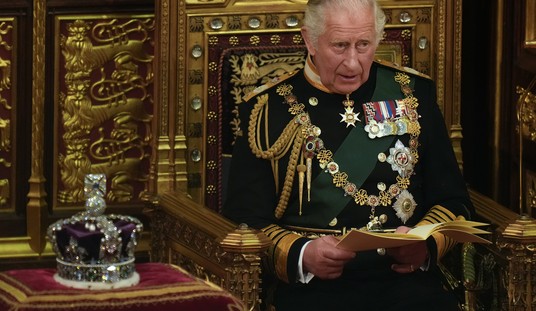According to Harry Reid’s own standards, he should lose his entire Hispanic vote over this, right? While Democrats paint Republicans who challenge birthright citizenship as extremists, it turns out that Reid was seventeen years ahead of the curve. In 1993, just after Democrats won the White House, Reid filed a bill that would have done exactly what some Republicans now demand — end birthright citizenship for children of illegal immigrants. Kerry Picket digs up the record for the Washington Times:
Title X of the Reid introduced bill shows the Nevada Democrat took Senator Lindsey Graham’s, South Carolina Republican, idea on the interpretation of the 14th Amendment and documented it into legislation:
“TITLE X—CITIZENSHIP 4 SEC. 1001. BASIS OF CITIZENSHIP CLARIFIED. In the exercise of its powers under section of the Fourteenth Article of Amendment to the Constitution of the United States, the Congress has determined and hereby declares that any person born after the date of enactment of this title to a mother who is neither a citizen of the United States nor admitted to the United States as a lawful permanent resident, and which person is a national or citizen of another country of which either of his or her natural parents is a national or citizen, or is entitled upon application to become a national or citizen of such country, shall be considered as born subject to the jurisdiction of that foreign country and not subject to the jurisdiction of the United States within the meaning of section 1 of such Article and shall therefore not be a citizen of the United States or of any State solely by reason of physical presence within the United States at the moment of birth.”
Even the summary of the bill contains language that would offend many of Mr. Reid’s supporters who are pushing amnesty for illegal immigrants in the United States:
“A bill to curb criminal activity by aliens, to defend against acts of international terrorism, to protect American workers from unfair labor competition, and to relieve pressure on public services by strengthening border security and stabilizing immigration into the United States.”
The bill appears to have gone nowhere, and it’s not clear whether it would have been effective or not. If the 14th Amendment grants birthright citizenship no matter whether the parents are in the US legally, legislation won’t undo that. It would take a constitutional amendment — which may be why S1351 never went anywhere in 1993 or 1994 in the 103rd Session of Congress.
On the other hand, the proviso of “and subject to the jurisdiction thereof” in the language of the 14th Amendment leaves a good basis for courts to determine a meaning that requires one parent to either be a citizen or to have entered the country legally. As far as I’ve seen, that argument hasn’t been tested in court to see whether a constitutional amendment is even required. In that case, a bill passed by Congress like S1351 would at least give the courts a sense of Congress on the meaning of the 14th amendment, although a court wouldn’t be required to make that an overriding consideration.
In any case, this shows the utter hypocrisy of Harry Reid and Democrats in general in their effort to paint questions over birthright citizenship as somehow extreme. Reid himself thought it important enough to draft and submit legislation to limit it to its common-sense application to those legally in the US.
Weasel Zippers, Red Dog Report, and Moe Lane have more thoughts on this.
Update: Greg Sargent acknowledges that Reid did try to get this passed, but says there is more to the story:
Conservatives are pointing to this as proof of Reid’s hypocrisy in the wake of his claim the other day that he doesn’t understand how any Latinos could ever vote Republican. Ed Morrissey argued that by his own standard, Reid “should lose his entire Hispanic vote over this.”
Guess what: It happens to be true that Reid did introduce such a bill. And it was indefensible. But here’s the thing: I’ve learned that Reid already apologized profusely for this in a speech in 2006, admitted he was wrong, and described this as the “low point” of his career. In other words, Reid himself agrees that it was indefensible.
Interesting, but that didn’t happen in a bubble, either. The first big push for amnesty came in 2006, too, and came from Ted Kennedy while Reid was minority leader. It’s one way that Reid’s record shows that he moved a lot more towards the Left the longer he stayed in Washington. But also, this was Reid’s position for 13 years. Was Reid a self-described extremist during this period?








Join the conversation as a VIP Member